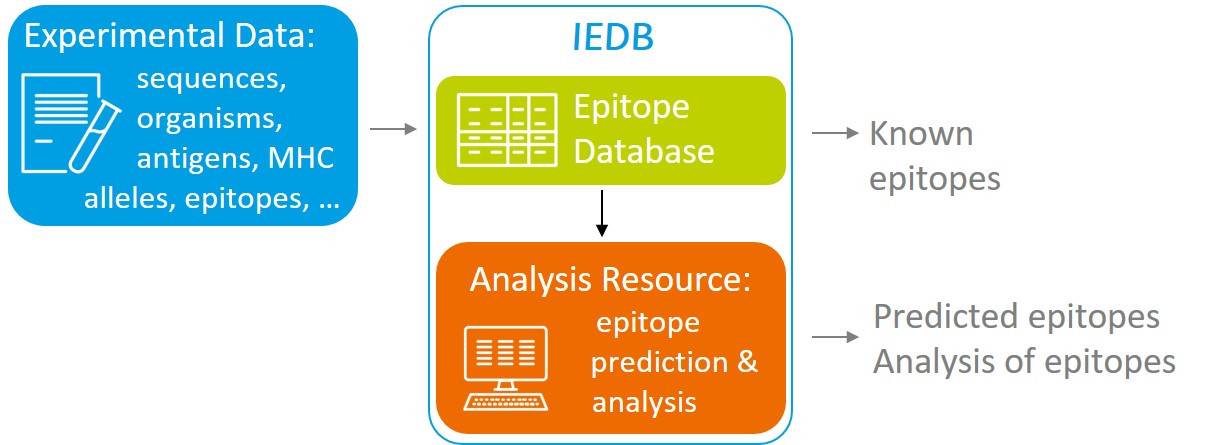Immune Epitope Database - IEDB
T Cell & B Cell Epitope Database & Prediction with IEDB
The Immune Epitope Database - IEDB is a comprehensive free online resource that serves as a repository of hundreds of thousands of experimentally characterized immune epitopes, MHC binding peptides and related data. It provides information about immune epitopes, including antigenic peptides, T-cell epitopes, B-cell epitopes, and MHC binding peptides (major histocompatibility complex ligands).
To use the IEDB, researchers can search for specific epitopes or antigens of interest using various search criteria, such as organism, epitope sequence, disease, MHC restriction, or assay type. The database allows users to access detailed information about individual epitopes, including their source, immune response, references and experimental data.
The IEDB also contains an epitope prediction from a given antigen sequence. Researchers can use the IEDB tools for MHC binding prediction, MHC epitope prediction, B-cell and T-cell epitope prediction.
You can also submit your own epitope data to contribute to the database. The National Institute of Allergy and Infectious Diseases (NIAID) maintains and funds the database.
Fig. 1:
IEDB consists of the epitope database featuring experimental data and the analysis resource. Apapted from Sette at al.https://doi.org/10.3389/fimmu.2017.00278
Applications of IEDB
The IEDB has numerous applications in immunology. It can aid in the identification of potential targets and candidates, the design of epitope-based approaches, and the study of immune responses to infectious diseases, during allergies and autoimmune disorders as well as after transplantation. Additionally, the database can assist in the development of diagnostic tools and therapeutic interventions targeting specific epitopes.
Predictions IEDB offers to scientists:
- MHC binding peptides
- MHC binding prediction
- Epitope prediction
- B-cell epitope prediction
- T-cell epitope prediction
IEDB is regularly updated with new data and features, ensuring that it remains a valuable tool for immunologists and vaccine developers worldwide.
Immune Epitope Peptides
In the scientific community, the IEDB is a well-known and widely used resource. It is recognized for its comprehensive collection of immune epitope data and its user-friendly interface, which allows researchers to easily access and analyze epitope-related information. The vast majority of epitopes are peptidic epitopes with some carbohydrates, lipids being the exception. Specific peptide epitopes can be used for stimulation of antigen-specific T cells in T cell assays such as ELISPOT, or to monitor humoral immune responses using Peptide ELISA or peptide microarray analysis. However, different immune cells require epitopes of different length:
- CD8+ cytotoxic T cells represent MHCI and need peptide epitopes of 8 - 10 aa length
- CD4+ T cells represent MHCII and use peptide epitopes of 12 - 18 aa length
- Antibodies are MHC independent and require small peptides of different lengths
IEDB & CEDAR
The Cancer Epitope Database and Analysis Resource CEDAR is the equivalent to IEDB. It collects and freely offers data on cancer epitopes and is funded by the National Cancer Institute (NCI). CEDAR also offers tools to predict and analyze cancer epitopes.
JPT is Your Epitope Provider
JPT is an expert in peptide synthesis, producing hundreds of thousands of peptides per year. In the last 20 years, JPT has been the pioneer in epitope discovery and T-cell science thanks to its patented technologies. The company offers a wide range of peptide-based and bioassay solutions for immunology:
- Catalog of PepMixTM Peptide Pools: HBV, CMV, Influenza, SARS-CoV-2, HPV, EBV …
- Catalog of individual epitopes / antigen peptides: NY-ESO-1, Melan-A…
- Synthesis of Custom PepMixTM Peptide Pools and individual Custom Peptides
- Custom synthesis of peptide libraries at lowest costs
- Peptide microarrays
- Peptide-coated ELISA plates
- ELISpot services
- ELISA service
- Epitope mapping service
Contact us for further question about peptides!
* This discount code is applicable for one purchase in our webshop.


